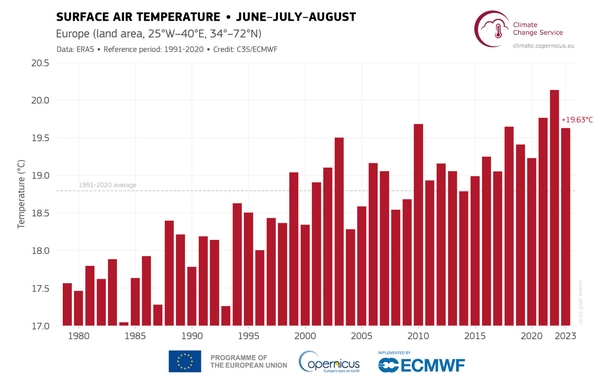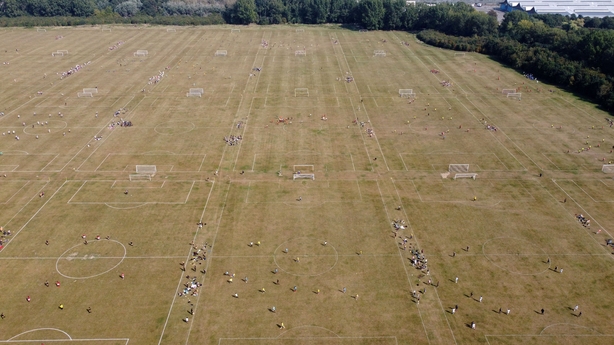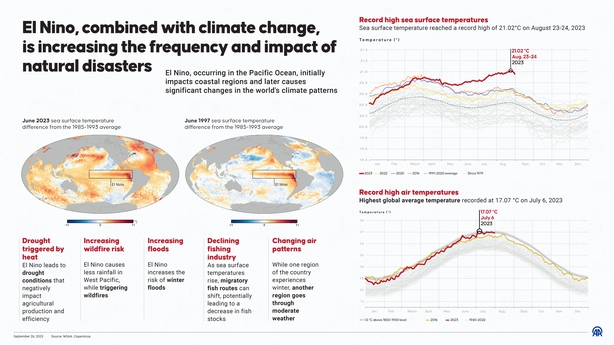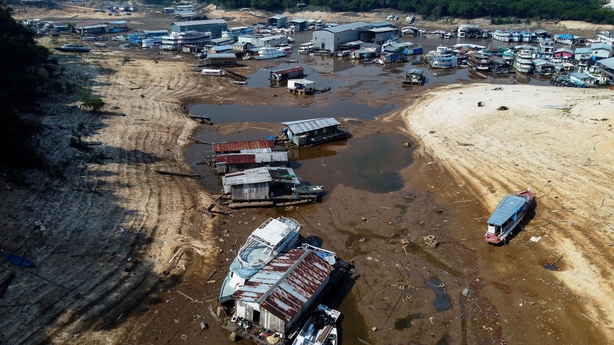Last month was the hottest September on record by an "extraordinary" margin as the world comes closer to breaching a key warming limit, the EU climate monitor has said.
Much of the world experienced unseasonably warm weather in September, in a year expected to be the hottest in human history and after the warmest-ever global temperatures during the Northern Hemisphere's summer.
September's average surface air temperature of 16.38C was 0.93C above the 1991-2020 average for the month and 0.5C above the previous 2020 record,the Copernicus Climate Change Service (C3S) said in a report.
Temperature records are normally broken by much smaller margins closer to one-tenth of a degree.
The report said the figure was "the most anomalous warm month" in its dataset going back to 1940 and around 1.75C hotter than the September average in the 1850-1900 pre-industrial period.
"We've been through the most incredible September ever from a climate point of view. It's just beyond belief," C3S Director Carlo Buontempo said.
"We have never seen anything like this, not only in my professional experience, but in living memory and in all likelihood in our history as human beings on this planet.
"Climate change is not something that will happen ten years from now. Climate change is here," he added.
The unprecedented September temperatures "have broken records by an extraordinary amount", according to C3S Deputy Director Samantha Burgess.
Speaking to RTÉ's News at One, she said this year has been "really anomalous" with some of the "warmest months" on record.
"We have had the warmest June, July, August and now September."
She said it was half a degree warmer this September compared to previous Septembers. "It really is quite surprising," she said.
Dr Burgess said 2023 is now on track to be the warmest year that humans have ever seen. However she said it does not necessarily mean 2024 will be warmer than this year.
She said there is natural variability with some winters cooler or warmer than others.
"The amount of heat that we have on the surface ocean, and developing El Nino, the probability is that " this warming is here to stay at least for the next few months."

Global average temperatures from January to September were 1.4C higher than 1850-1900, almost breaching the 1.5C warming goal of the 2015 Paris Agreement, C3S reported.
That threshold was the more ambitious target of the accord and is seen as essential to avoid the most catastrophic consequences of climate change.
The January-September average global temperature was 0.05C higher than the same nine-month period in 2016, the warmest year recorded so far.
The El Niño weather pattern, which warms waters in the southern Pacific and stokes hotter weather beyond, is likely to see 2023 becoming the hottest year on record in the next three months.

Scientists expect the worst effects of the current El Nino to be felt at the end of 2023 and into next year.
Although El Niño played a role in the warming, "there's no doubt that climate change has made it much worse", Mr Buontempo told AFP.
Europe experienced its hottest September on record at 2.51C higher than the 1991-2020 average, with many countries passing national temperature records for the month.
The average sea surface temperature for the month excluding the polar regions also reached all-time highs for September, at 20.92C.
Scientists said warmer sea surface temperatures driven by climate change is making extreme weather events more intense, with Storm Daniel sparking devastating floods in Libya and Greece in September.

Antarctic sea ice remained at a record low level for the time of year, while monthly Arctic sea ice was 18% below average, C3S added.
Oceans have absorbed 90% of the excess heat produced by human activity since the dawn of the industrial age, according to scientists.
Warmer oceans are also less capable of absorbing carbon dioxide, exacerbating the vicious cycle of global warming as well as disrupting fragile ecosystems.
World leaders will gather in Dubai from 30 November for COP28 as the consequences of global warming accelerate.

Finding a consensus on cutting greenhouse gas emissions responsible for climate change, financing for adaptation and mitigation, and boosting renewable energy will be key negotiating topics.
The United Nations said there were "divergent views" among parties over how to reach the Paris goals, even if they agreed that past climate action has been insufficient.
Pope Francis had earlier warned the world "is collapsing" due to global warming, urging COP28 participants to agree to binding policies on phasing out fossil fuels.
"Two months out from COP28, the sense of urgency for ambitious climate action has never been more critical," said Ms Burgess.

